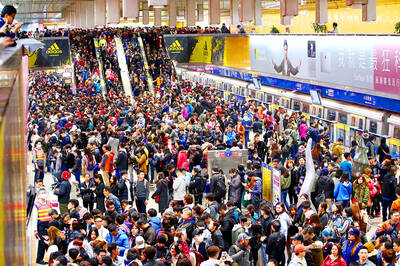The Taiwan Pharmacist Association and the Pharmacist Association of the ROC (Republic of China) yesterday protested against a Ministry of Health and Welfare proposal that would allow licensed Chinese herbal remedy dealers to prescribe certain types of medication.
Last month, the ministry announced plans to amend the Pharmaceutical Affairs Act (藥事法) so that Chinese herbal remedy dealers would not be able to prescribe medication nor produce herbal pills, powders, creams or extracts.
In addition, the amendment would require them to acquire a “Chinese herbal medicine management technician” license to import and sell herbal medicines, but they would still not be allowed to prescribe or produce drugs.
The proposal invoked protests from Chinese herbal remedy dealers, who say that the ministry is depriving them of their rights and threatening the end of the traditional industry.
After hundreds of dealers protested in front of the ministry on Nov. 7, the ministry modified its policy to allow dealers with Chinese herbal medicine management technician licenses to prescribe or produce drugs.
However, more than 100 pharmacists protested in Taipei yesterday, voicing their discontent over the ministry’s new licensing system.
Holding signs with slogans such as “herbal medicine licenses easily given out will endanger the public,” “loosened herbal medicine regulation is unsafe” and “trampling over the profession will harm the public,” the pharmacist associations said allowing dealers to become technicians who are allowed to directly prescribe and produce medication violates pharmacists’ rights.
Taiwan Pharmacist Association spokesperson Shen Tsai-ying (沈采穎) said herbal remedy sellers handle business activity, but prescribing and producing medication needs professional pharmaceutical skills, and the two activities should not be conflated.
She said only about 1 percent of Taiwanese take traditional medicine exclusively, meaning that the other 99 percent might take a mixture of both traditional and Western medicine, but herbal remedy dealers might not be aware of possible drug interactions that could harm consumers.
The association is planning to increase the proportion of herbal medicine in the national pharmacist licensure examination and also increase the required courses of herbal medicine prescription for pharmacists, Shen said.
The ministry said it plans to allow dealers who are familiar with herbal remedies to gain professional licenses and prescribe non-therapeutic medications and health supplements, adding that therapeutic medication should be prescribed by pharmacists, but it would continue to communicate with the industries.

People can take the Taipei MRT free of charge if they access it at Nanjing Sanmin Station or Taipei Arena Station on the Green Line between 12am and 6am on Jan. 1, the Taipei Department of Transportation said on Friday, outlining its plans to ease crowding during New Year’s events in the capital. More than 200,000 people are expected to attend New Year’s Eve events in Taipei, with singer A-mei (張惠妹) performing at the Taipei Dome and the city government’s New Year’s Eve party at Taipei City Hall Plaza, the department said. As people have tended to use the MRT’s Blue or

Civil society groups yesterday protested outside the Legislative Yuan, decrying Chinese Nationalist Party (KMT) efforts to pass three major bills that they said would seriously harm Taiwan’s democracy, and called to oust KMT caucus whip Fu Kun-chi (傅?萁). It was the second night of the three-day “Bluebird wintertime action” protests in Taipei, with organizers announcing that 8,000 people attended. Organized by Taiwan Citizen Front, the Economic Democracy Union (EDU) and a coalition of civil groups, about 6,000 people began a demonstration in front of KMT party headquarters in Taipei on Wednesday, organizers said. For the third day, the organizers asked people to assemble

Taipei is participating in Osaka’s Festival of Lights this year, with a 3m-tall bubble tea light installation symbolizing Taiwan’s bubble tea culture. The installation is designed as a bubble tea cup and features illustrations of Taipei’s iconic landmarks, such as Taipei 101, the Red House and North Gate, as well as soup dumplings and the matchmaking deity the Old Man Under the Moon (月下老人), affectionately known as Yue Lao (月老). Taipei and Osaka have collaborated closely on tourism and culture since Taipei first participated in the festival in 2018, the Taipei City Department of Information and Tourism said. In February, Osaka represented

Taiwanese professional baseball should update sports stadiums and boost engagement to enhance fans’ experience, Chinese Professional Baseball League (CPBL) commissioner Tsai Chi-chang (蔡其昌) told the Liberty Times (sister paper of the Taipei Times) in an interview on Friday. The league has urged Farglory Group and the Taipei City Government to improve the Taipei Dome’s outdated equipment, including relatively rudimentary television and sound systems, and poor technology, he said. The Tokyo Dome has markedly better television and sound systems, despite being 30 years old, because its managers continually upgraded its equipment, Tsai said. In contrast, the Taipei Dome lacked even a room for referees